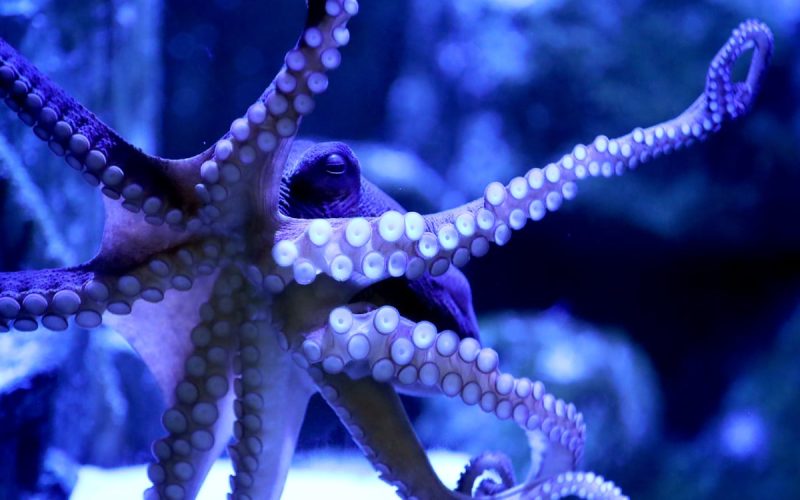It would be terrible to raise octopuses for human eating because they are so intelligent, clever, and have nine brains. They can also utilize tools and identify people.
Earlier this month, a group of octopus fans spoke to a committee of the Oregon Legislature, praising the many amazing characteristics of the popular eight-legged mollusk. Before a single octopus production plant is even proposed, nearly 70 people testified orally or in writing in favor of a bill that would outlaw octopus cultivation in the state.
The group’s mood was summed up by Damascus resident Natalia Neal, who wrote, “I urge you to stand on the right side of history by voting in favor of this bill.”
Rep. Anna Scharf, R-Amity, a member of the committee, has expressed skepticism about many of those passionate pleas, claiming that some of the bill’s arguments—such as the claim that raising octopuses would place an excessive burden on natural resources—were false and motivated by out-of-state groups and individuals who want to outlaw all large-scale meat production.
Scharf, who works on a fourth-generation family farm that grows wheat, hazelnuts, and other crops, added, “I won’t get into a debate about the intellectual ability of an octopus and some of the other things that we kill in our state that have high intellectual capability.”
The Oregon Farm Bureau has also expressed disapproval of the bill, claiming it sets a worrying precedent by outlawing the raising of an entire genus of animal without a convincing scientific explanation.
As a result, the measure has sparked a broad debate that has raised more profound and occasionally awkward concerns regarding the intelligence of the animals that Oregonians consume and the industrial production of meat in a culture where many people are making a commitment to increase their daily protein consumption.
Since octopuses can play games, identify their favorite humans, and recognize human hand signals, are they truly as intelligent as pigs and cows, two of the nation’s most popular meat sources?
In comparison to chicken, pig, beef, or fish, how many resources are needed to produce one pound of octopus?
Given that octopuses are a prized component of many international cuisines, including Asian, Mediterranean, and Pacific Islander, HB 2557 has also spurred discussions regarding cultural prejudice against them as a food source.
Environmental worries
Rep. Zach Hudson, a Democrat from Troutdale, stated that none of that had anything to do with his reasons for supporting the bill.
According to Hudson, this measure has nothing to do with whether or not we should eat octopuses. It concerns whether or whether they ought to be raised in captivity.
Rep. Zach Hudson, a Democrat from Troutdale, stated that he initially believed the proposal to outlaw octopus cultivation was a joke. According to Hudson, the law would not forbid the purchase, sale, or retention of wild octopuses for research or as pets. (Photo taken in January 2025)Graves, Mark/The Oregonian
Hudson stated that his main motivation for becoming a chief sponsor was his worry that farmed octopuses aren’t a sustainable food source due to the abundance of fish and crab they consume and that they may harbor parasites or diseases that could be transmitted to the Oregon coast through wastewater. However, he said that he also envisions octopuses being reared in incredibly terrible conditions in tiny plexiglass tanks stacked one on top of the other if such facilities were permitted.
Hudson informed the House Committee on Agriculture, Land Use, Natural Resources, and Water that a farming enterprise aimed at making the most money would probably cram as many octopuses as possible into tiny, empty tanks.
Although a Spanish company claims to be nearing the completion of the required technology, there are currently no octopus farms in the world that produce food. With its bill, Oregon would become the third state in the US to outlaw this new aquaculture practice, after California and Washington.
According to Rep. Courtney Neron, D-Wilsonville, the bill’s principal co-sponsor, “it’s about putting an end to cruel practices before they begin in Oregon and sending a clear message to other regions that might be considering allowing this practice that the west coastline is unified.”
Pictured here in January 2025 is Wilsonville, D.C. Representative Courtney Neron. Octopuses, she stated at a hearing in February, “are without a doubt one of my favorite animals to learn about.”Graves, Mark/The Oregonian
Given octopuse intelligence, proponents of animal welfare claim they don’t want to debate whether traditional American meat production methods, such raising cattle, pigs, and birds for food, may be more environmentally harmful or morally dubious. They stated that the purpose of this bill is to safeguard octopuses rather than to dismantle established meat producing enterprises.
Amanda Fox, executive director of Animal Rights Initiative, a national charity that is a primary force behind the bill in Oregon and bills in at least six other states, stated that lawmakers shouldn’t really be responsible for forcing people out of business.
Fox added, “This is a preventative issue.” And since we’re having problems regulating the current forms of farming, the majority of people strongly oppose extending farming to another intelligent species.
Last year, a similar bill before the US Congress failed. One in Hawaii also did so, but supporters this year resubmitted two legislation, both of which passed their initial committee hearings last week.
An octopus moment
Octopuses are obviously having a moment, thanks in part to My Octopus Teacher, the 2021 Oscar winner for best documentary and the 2022 best-selling book.A big Pacific octopus befriends a nightly cleaner at a fictional aquarium in the story Remarkably Bright Creatures.
An legislation recognizing octopuses as sentient beings with feelings and unique personalities was passed by the UK Parliament in 2022. According to the legislation, this also applies to a wide variety of other living things, such as crabs, lobsters, and all animals with backbones, such as mice, pigs, cows, fish, frogs, and chickens.
Observational reports have also shown octopuses squirting water jets at persons they didn’t like or one cunning octopus that crept into another tank to feed on live fish and then closed the lid to hide its tracks. Numerous reports of octopuses using jellyfish tentacles as a potential defense mechanism have been documented.
Researchers have warned against anthropomorphizing octopuses and our understanding of how their brains function, however, as public awareness of their cognitive abilities has grown. Numerous studies have shown that dogs have over 500 million neurons in their cerebral cortex alone, but octopuses have roughly 500 million neurons spread across their nine so-called brains. About 430 million are found in domestic pigs. For contrast, there are 86 billion people on the planet.
It has been suggested that Octopus vulgaris could be raised for food. They have a one to two year lifespan. (Photo of the file)NJ.com’s Lori M. Nichols | NJ Advance Media
However, a 2022 study discovered that a large portion of the octopuse’s neuron power is dispersed in the mini-brains in each of its limbs, which regulate their autonomous movement, in contrast to other mammalian brains. This has sparked conjecture over their capacity for awareness as we understand it.
If a commercial agricultural enterprise ever got off the ground in Oregon, there are still many unanswered questions about what it might look like.
The Spanish business Nueva Pescanova is developing the closest one in the world and plans to construct a facility in the Canary Islands.News that brokeof the planned facility in 2022 created an uproar, including over what s seen as a slow and painful way of bringing on their deathsthrough submerging them in ice baths.
Concerns have also been raised regarding the potential environmental impact of octopus cultivation. According to animal supporters, one pound of octopus meat requires three pounds of fish or crab. Nueva Pescanovatold NPR in 2024that it planned to thoughtfully source its feed, like from discards from fishing or other sustainable sources.
The Oregon Farm Bureau s lobbyist, Ryan Krabill, said his organization objects to the movement to stop an entire food producing industry before it begins. He argues that as long as public health and safety rules are followed, the Legislature shouldn t open a Pandora s box into forbidding the farming of certain food sources because of an animal s intellectual abilities.
Appreciate all animals
However, there has been an overwhelming amount of support for the law. Just four of the more than 70 individuals who filed written testimony or testified during the hearing in early February opposed the plan. That included Krabill and a woman who thinks octopus farming could be a boon to Oregon s economy.
Those who encouraged the Legislature to take octopuses’ possible future into consideration were far more common.
These are intelligent creatures that don t deserve this torture, wrote Milwaukie resident Sarah Vostal.
Added Brenda Hess of Forest Grove: Stop hurting all animals. Please love and appreciate all animals.
It has been suggested that Octopus vulgaris could be raised for food. (Photo of the file)Lori M. Nichols | NJ Advance Med
Some of the testimony was disputed by knowledgeable sources.
Fox, the executive director of Animal Rights Initiative, told the legislative committee earlier this month that because of their exceptional cognitive abilities, octopuses are known for escaping making them more likely than any other aquacultured species to spread disease, parasites, and genetic mutations on farms and to wild populations. For example, multiple sources report frequent escape attempts at the Seaside Aquarium, where octopuses are willing to sustain injuries in their pursuits.
When The Oregonian/OregonLive asked Fox for her source, she referenceda 2013 Trip Advisor commentin which someone who said they visited the aquarium said they saw an octopus constantly swimming itself in to the rock wall trying to escape or trying to swim. Fox also citeda 2015 online travel magazine articleabout the Seaside Aquarium that alluded to some octopuses trying to escape their tanks more than others.
Keith Chandler, manager of the Seaside Aquarium, said on rare occasions an octopus has crawled out of its tank out of curiosity or confusion in his 44 years there.
They re not scheming and plotting and trying to come up with ways to hotwire the car and drive back to the ocean, Chandler said.
Assistant manager Tiffany Boothe said the aquarium keeps its three octopuses well-fed, so they don t have a reason to want to leave. We feed them fresh razor clams and Dungeness crabs on a regular basis.
In 2016, however, Inky the octopusmade worldwide headlineswhen he escaped his tank at a New Zealand aquarium, squeezed through a 50-meter drain pipe and made it to the ocean. The public debated Inky s intentions, however unsure whether the aging creature was curious, hungry or experiencing what experts call senescence, a dementia-like stage of odd behavior and confusion that octopuses go through before they die.
Fox also said commercial octopus farms in Oregon could decimate the state s crabbing industry by consuming more crab than it could produce. The Oregon Dungeness Crab Commission, however, hasn t taken a stand on the bill. And its executive director, Crystal Adams, told The Oregonian/OregonLive that her initial impression is that commercial octopus farming is not necessarily something that would be an endangerment so far.
Rep. Anna Scharf R-Amity.Beth Nakamura
Scharf s skepticism about a need to ban octopus farming appears in the minority. No other lawmaker on the committee expressed an opinion during the bill s hearing and its co-chairs either didn t respond to Oregonian/OregonLive queries or said they had no comment. Scharf, however, told the news organization she s willing to take a stand.
Those things are red flags for me, she said. I feel the Legislature has better things to work on than banning an industry that does not even exist in Oregon and that very little is known about.
Aimee Green is covering the Oregon Legislature this session. Reach her at 503-294-5119,[email protected]@o_aimee.
Our journalism needs your support. Subscribe today toOregonLive.com.
Stories by
Aimee Green
-
I lived being denied menopause care : Oregon lawmaker promotes bill requiring more insurers to cover it
-
Oregon most frightening place to die, with nation s most expansive estate tax, Republicans say. They hope to change that
-
Oregon Republicans share to-do list: End homelessness, lower housing costs, oppose tax increases
-
DAs to lawmakers: Accused child rapist, killers, drug traffickers released from jail as cases stall with no public defenders
-
Avalanche of bills: Oregon lawmakers file record number, spurring concern over bottlenecks










